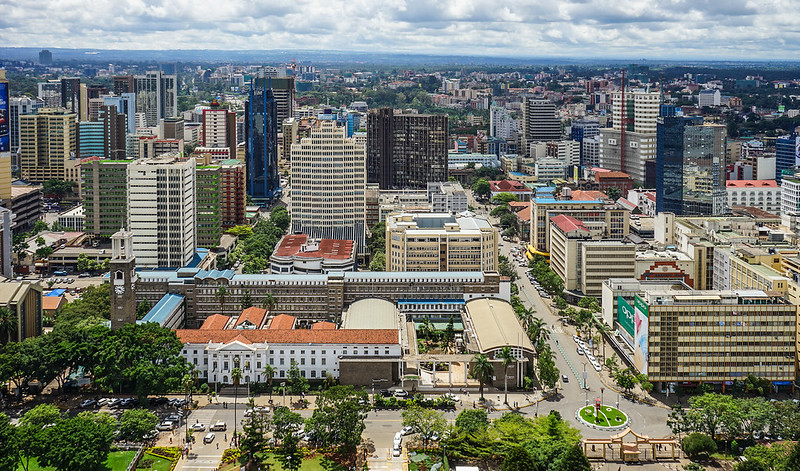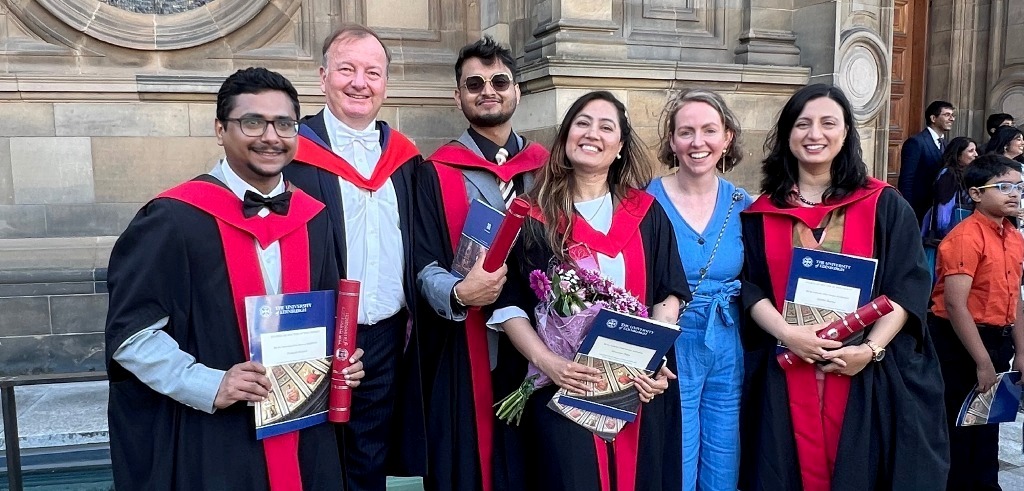
- Close
29/03/2021 | Global
The importance of co-produced and interdisciplinary research for resilient future cities: Tomorrow’s Cities at the Commonwealth Scientific Conference 2021

The 21st century is marked by a politics of uncertainty and complex problems. We have already seen this in the first 20 year with the acceleration of the climate crisis, the global financial crisis of 2008 and different epidemics and pandemics. There is a need to build resilient social systems that can effectively adapt in the face of uncertainty and shocks. Science and research can play an essential role to help build resilient societal systems, especially when they are co-produced and interdisciplinary. In February 2021, a group of Early Career Researchers (ECRs) from across 32 Commonwealth nations came together to discuss precisely this.
On the 4 December 2020, Joanes Atela invited myself and Becky Richardson to represent the ECR work in Tomorrow’s Cities at the Commonwealth Scientific Conference in February 2021. Not aware of the prestige and selective nature of this conference, I jumped at this opportunity to work with fellow ECRs to represent the work of the Hub at an international conference. A couple of weeks later I received the official invitation and nomination to be part of a panel on “A just transition to a sustainable Commonwealth” and to speak about “the importance of interdisciplinary and co-produced research to build resilient cities for the future”. A topic close to my heart, and of course, close to the mission of the Hub! Based on this nomination to speak about an assigned topic, rather than submitting an abstract, I realised that this was not your average research conference.
In line with the participatory and collaborative ethos of my research, I wanted to be able to share this platform with my fellow Tomorrow’s Cities ECRs who are undertaking interdisciplinary and/or co-produced research within the Hub. Rachana Updhyaya, Charles Tonui, Camilo Zapata, Giuseppe Forino, Ji-Eun Byun and Emin Mentese enthusiastically contributed their work to the talk. Thanks to them I was able to give an overview of the interdisciplinary and co-produced research in Tomorrow’s Cities to date in my pre-recorded talk.
During the panel session, each member was given three minutes to provide a summary of the key points in their pre-recorded video. To help discuss co-production, I introduced the concept of the “triangle that moves the mountain” that originated in Thailand (Wasi, 2000). The triangle has three power poles representing the government sector (policy makers, politicians, local administrative organisations, and government services); the people sector (civil society, communities, and citizens); and the knowledge sector (academia, think tanks, and research institutions). The core principle is that the three groups work together to achieve a common goal—that is, “to move the mountain.” The mountain is the big complex problems. The three minute presentations were the followed by interesting questions and a fascinating discussion on challenges in doing research with stakeholders, what key actions Commonwealth countries should undertake towards recovery and what an interesting research agenda would be to address inequalities in a just transition.
The conference itself was inspiring and exciting. The theme was “science for a resilient future”. It was an interdisciplinary conference, bringing together nearly 300 ECRs from 32 Commonwealth nations from a broad range of disciplines to listen to and discuss how research plays a central role in Commonwealth countries delivering a resilient future, while dealing with the dual crises of health and environment we are currently facing. As with any conference, there were many interesting talks, panel discussions and networking events, all delivered on an online platform. The Royal Society has uploaded daily highlight videos you can watch on Youtube if you are interested. For me, the following points stood out as main take-home messages for my own career, fellow ECRs and the Hub research more broadly:
- We need to contribute and embrace a diversity of perspectives for science to contribute innovatively and effectively to building a resilient future. This means that women and LGBTQI researchers are encouraged to take on leadership and actively contribute to their research field from their own positionalities. Sometimes you can achieve more by leading others than undertaking the research yourself. This means that, as a female and/or LGBTQI researchers, we need to move through the career stages quicker than you may have planned or use alternative pathways to get there if the current systems are not supportive. This requires courage and out-of-the-box thinking, but science and the world needs you!
- His Excellence Anote Tong (Former President of Kiribati) when talking about the climate crisis stated that “it is not just about science, conservation, the environment, it has always been about people”. The same holds true for our work in Tomorrow’s Cities, ultimately it is about the people and therefore we need to work with the people and the sectors that have impact on the people, and actively bridge the gap between policy, science and the community. The importance of the business sector and the power it holds was also highlighted by Paul Dickinson (Executive Chair of CDP). Compared to the 1980s, when governments held most power, the business sector is a powerful actor in the dual health and environmental crises of the 2020s. For research it is important to interact with this key actor and appreciate its power. Throughout the conference collaborations with community, policy and business were emphasized and with that the importance of developing our soft skills like empathizing, communicating, and building relationships with policy makers and community stakeholders. Being able to explain complex concepts in succinct and understandable language is an essential skill. A panel on “developing and strengthening networks of ECRs” chaired by Joanes Atela even called these soft skills more important for real-world research impacts than having a shining track record of academic publications. It is promising to see that UKRI is moving towards greater acknowledgement of these kinds of skills and impact[1].
- Finally, the closing message by Baroness Patricia Scotland (Secretary-General of The Commonwealth) was one of hope, highlighting collaboration and innovation as essential to tackling the dual crises of health and environment. Research has a central role to play in developing solutions (like vaccines and carbon capture) and by providing scientific advice to the leaders. Especially when our scientific advice provides comprehensive perspectives based on interdisciplinary and co-produced research we can contribute to building resilient and just societal systems.
The key messages from this conference will be shared with the Commonwealth Heads of Government Meeting in June and later at COP 26. I felt very privileged to contribute to this from Tomorrow’s Cities and feel invigorated and inspired about the important role that our interdisciplinary and co-produced research has for society.
Wasi, P. (2000). “Triangle That Moves The Mountain” and Health Systems Reform Movement in Thailand. 4(2), 5.
[1] https://www.ukri.org/apply-for-funding/how-were-improving-your-funding-experience/introducing-a-better-way-for-you-to-evidence-your-contributions/


